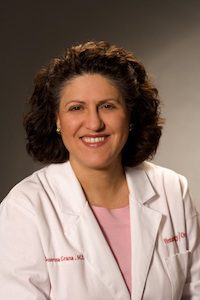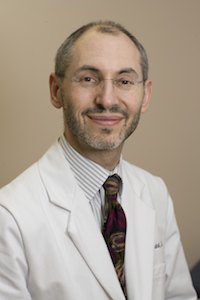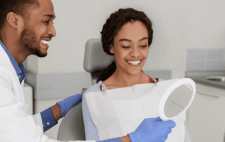Experts from MD Anderson Cancer Center at Cooper explain five ways to reduce your risk.
- Eat a Healthy Diet

Dr. Kristin Brill
To reduce your risk of cancer, look no further than your pantry and refrigerator.
“A healthy diet can help reduce a person’s cancer risk,” says Kristin Brill, MD, program director of The Janet Knowles Breast Cancer Center. “A diet rich in plant-based foods, whole grains and legumes like beans or lentils can give your body the range of vitamins, minerals and antioxidants it needs to stay healthy.”
“A healthy diet also means limiting your intake of red meat, salt and alcohol, and avoiding processed meat and sugary beverages” says Brill.
- Exercise
Just 20 minutes a day could mean a reduction in your risk of cancer.
“We’re recognizing more and more that obesity can increases a person’s risk for several types of cancer, including breast and colorectal cancers,” says Brill.
Excess weight causes the body to produce more estrogen and insulin, which are hormones that can stimulate cancer growth, Brill explains. Any type of regular exercise can make a big impact.
“Walking, group aerobic classes, even chair yoga – there’s an exercise out there for everyone,” says Brill.
- Get Your Cancer Screenings

Dr. Generosa Grana
Routine screenings are one of the most powerful tools in fighting cancer.
“Advances in cancer screenings now make it possible to find many tumors in their earliest, most treatable stages,” says Generosa Grana, director of the MD Anderson Cancer Center at Cooper. “Mammograms and Pap smears are important for women, and everyone over 50 should undergo colorectal screenings.”
Doctors may recommend additional screenings based on each patient’s medical history and risk factors, says Grana, such as lung cancer screenings for those with a history of smoking.
- Get the HPV Vaccine & Know Your HPV Status
Although the human papillomavirus (HPV) is extremely common – approximately 80 percent of men and women will have an HPV infection at some point in their lives – those three letters have a huge impact on your cancer risk.
“Most people with HPV don’t know they’re infected and never develop symptoms or health problems from it,” says David Warshal, MD, director of the Gynecologic Cancer Center. “But it can lead to several types of cancer, including cervical, vulvar, vaginal, anal, penile and throat cancers.”

Dr. David Warshal
These cancers are almost exclusively caused by HPV, and the key to preventing them, says Warshal, lies with a vaccine.
“The latest vaccine, Gardasil 9, protects against nine types of HPV, seven of which are associated with 90 percent of cervical cancers. We recommend that boys and girls receive the HPV vaccine between 11 and 13 years old,” he says. “Preventing these HPV infections would mean preventing tens of thousands of cancers annually in the United States – it’s a no-brainer.”
- Know Your Family History & Risk Factors
When it comes to preventing cancer, knowledge can be power.
“Knowing your family history and cancer risk factors can help you and your doctor better manage your health, but it’s only one piece of it,” says Grana. “Genetic testing can be a tool for preventative action and help you make decisions on things like additional cancer screenings, preventative drugs and even surgeries.”
“But there are not just medical implications to genetic testing – there are also psychological implications,” says Grana. “Cooper has an excellent genetic testing program, and we’re here to ensure people understand and are prepared to deal with their results.”











